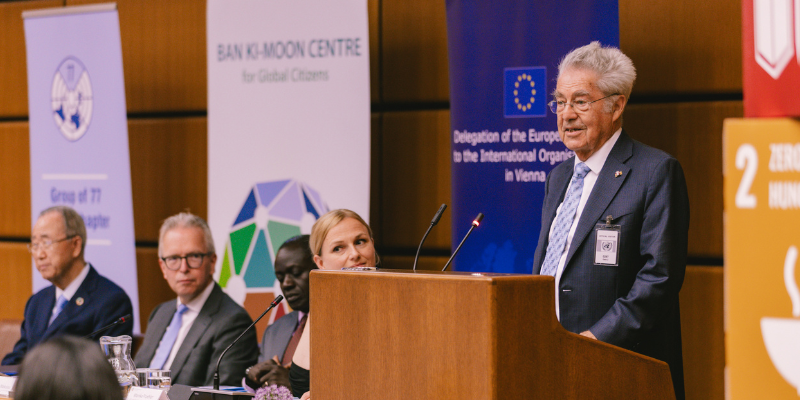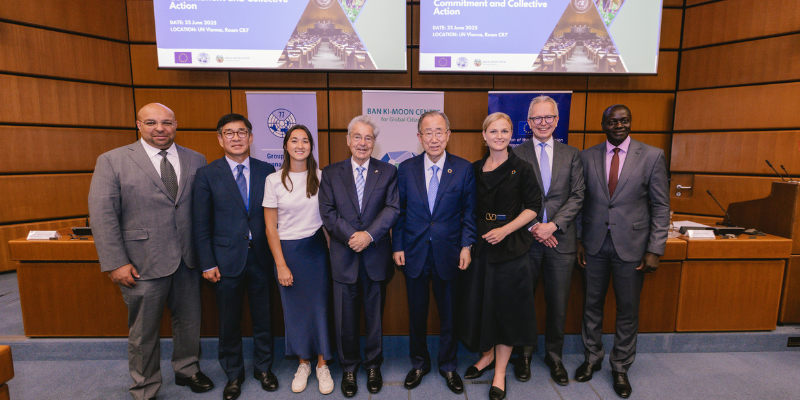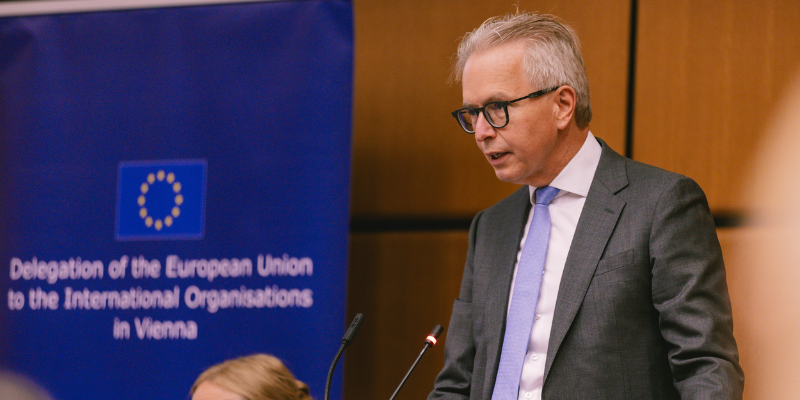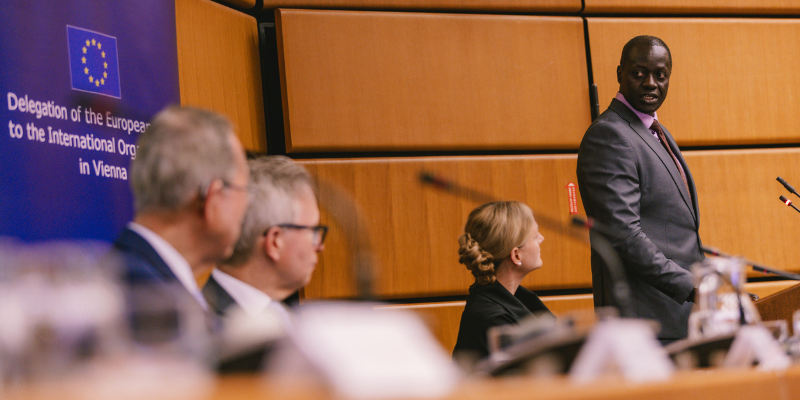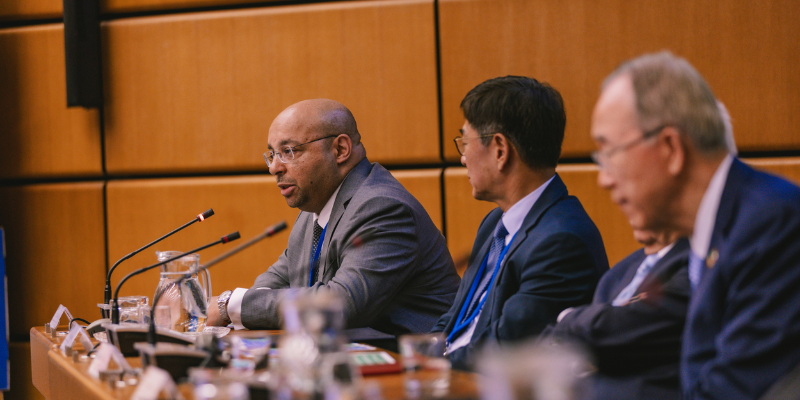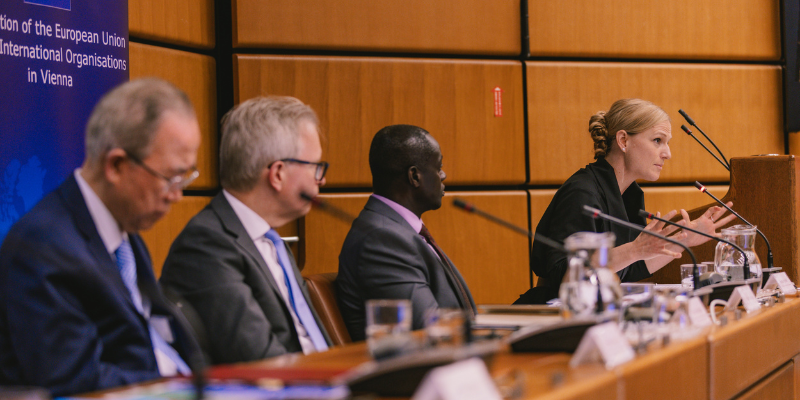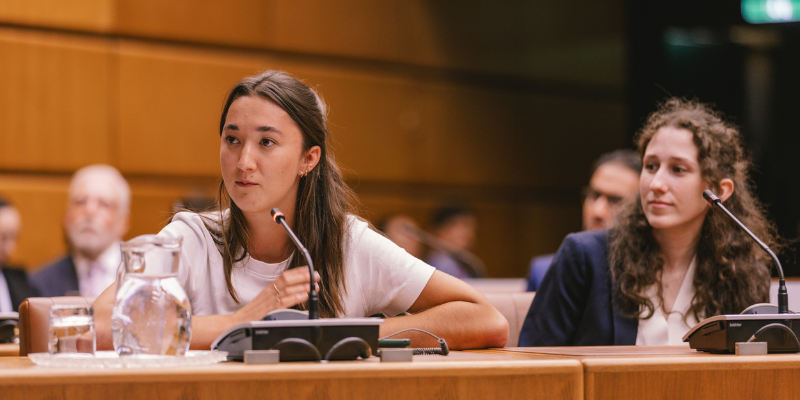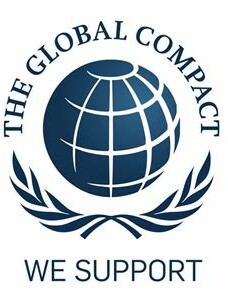On June 25, 2025, the Ban Ki-moon Centre for Global Citizens, the Delegation of the European Union to the International Organisations in Vienna, and the Group of 77 – Vienna Chapter organized a high-level event at the United Nations Headquarters in Vienna (UNOV) to mark the 80th anniversary of the United Nations Charters as well as the 10th anniversaries of the Sustainable Development Goals and the Paris Climate Agreement. They convened diplomats, UN leaders, and changemakers to discuss the future of multilateralism in today’s increasingly fractured world. The session called for a renewed global commitment to collective action, cooperation, and inclusive leadership.
Opening Remarks
H.E. Ghada Waly, Director-General of UNOV and Executive Director of UNODC, opened the event with a candid acknowledgment of the current crisis of trust in multilateral institutions, the rule of law, and global governance. She reminded participants that multilateralism itself was born out of crisis—and can once again be a vehicle for hope and solutions.
H.E. Dr. Heinz Fischer, former President of Austria and BKMC Co-chair, reflected on Austria’s own multilateral journey, recalling the debates around establishing the UN presence in Vienna. He highlighted Austria’s current candidacy for a non-permanent seat on the UN Security Council and urged accountability and adherence to international law in light of current wars and instability, such as in Ukraine and Gaza.
Keynote by H.E. Ban Ki-moon
Former UN Secretary-General and BKMC Co-chair Ban Ki-moon gave a deeply personal and urgent keynote. Recalling his own childhood shaped by war and the support of the UN, he called multilateralism “the only viable path” toward peace, justice, and sustainability. He warned of rising geopolitical tensions, climate threats, and the erosion of international norms, calling for stronger UN leadership and more inclusive global governance.
Ban emphasized youth and gender empowerment as essential pillars of a modern multilateral system, celebrating the establishment of UN Women and the impact of the BKMC’s youth engagement, which has reached over 2.5 million young people. “We must not only listen to youth—we must include them in decision-making,” he urged.
Statements from Permanent Representatives
H.E. Carl Hallergard (EU) reaffirmed Europe’s commitment to peace, the 2030 Agenda, and achieving the SDGs, including SDG5 on gender equality. The EU will continue working to end Russian aggression against Ukraine and support a just, lasting peace in line with international law. The EU welcomes the ceasefire between Israel and Iran and hopes it will lead to broader de-escalation, while also continuing diplomatic efforts on the Iranian nuclear issue. The EU maintains its call for a ceasefire in Gaza, full humanitarian access, and supports peace efforts in Sudan and other conflicts, believing diplomacy – not military force – is the path to resolution. (Full statement can be read here.)
H.E. Maurice Makoloo (Kenya / Chair of the G-77) stressed that the world is facing not only political shifts but also demographic and economic realignments, making it essential to adapt the multilateral system. He emphasized the legacy of the Group of 77, which just celebrated its 61st anniversary, as proof that cooperation among Global South countries can drive change.
H.E. Ham Sang Wook (South Korea) and H.E. Talal Al-Fassam (Kuwait) underlined the global nature of today’s crises—conflict, climate, displacement, and technology—and called for stronger, more inclusive international institutions.
Monika Froehler, BKMC CEO, reaffirmed the BKMC’s mission to empower youth and women – who make up 75% of the world’s population. She emphasized the BKMC’s role in building bridges between grassroots changemakers in the global south and policy leaders, and in equipping young people with the tools to become engaged global citizens – who act with passion and compassion for the greater good of humanity as a whole. “We don’t have a Plan B—only the SDGs and the Paris Agreement as “Plan A” – as we also don’t have a Planet B” she quoted Ban Ki-moon, underscoring the urgency of renewed collective action.
Floor statements
Jana Berchtold, former UN Youth Delegate of Austria, offered a powerful statement on youth inclusion in peacebuilding and decision-making. She emphasized that meaningful youth participation must not be sidelined in times of crisis but embraced. Highlighting the 25th anniversary of the Women, Peace and Security (WPS) Agenda and the 10th anniversary of the Youth, Peace and Security (YPS) Agenda, she called for more action, funding, and genuine power-sharing.
State of Palestine’s representative criticized the paralysis of the current UN system and questioned whether a structure dominated by five permanent powers can still respond effectively to today’s realities. He urged reform and collective reflection on the UN’s future role.
The event served as a timely reminder that multilateralism must evolve to remain credible—becoming more inclusive, responsive, and people-centered—if it is to tackle the defining challenges of our time.
See below the Flickr Album to receive more impressions from the event. Copyright: BKMC/ Martin Krachler

